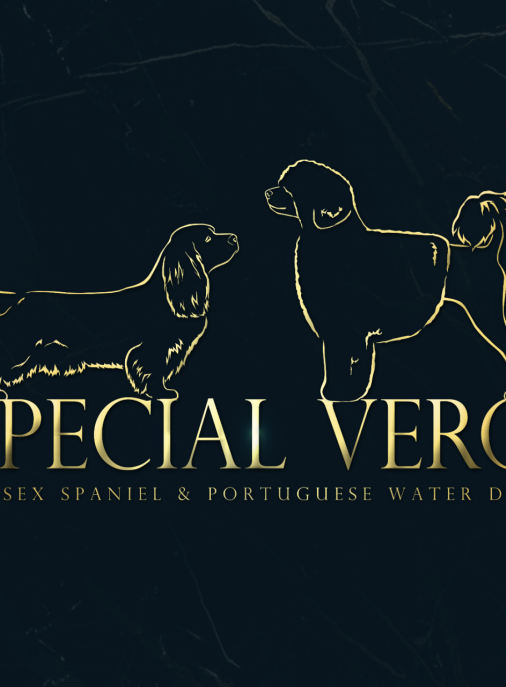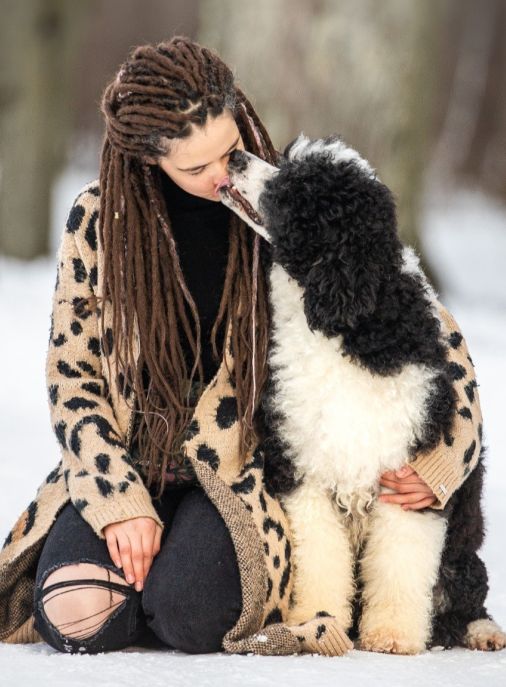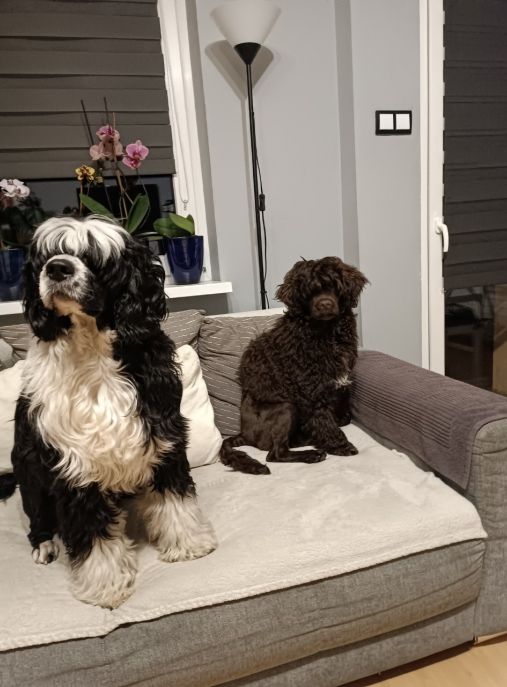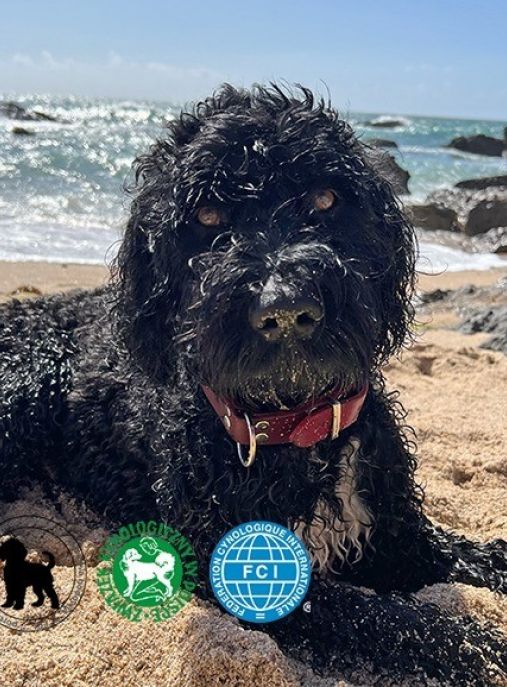The Portuguese Water Dog, also known as the Cão de Água Português, is a remarkable breed with a rich history and a unique set of characteristics. This medium-sized dog is known for its intelligence, agility, and strong swimming abilities, making it an excellent companion for water-related activities. With its distinctive curly or wavy coat and expressive eyes, the Portuguese Water Dog is a charming and lovable breed that has gained popularity worldwide.
The history of the Portuguese Water Dog can be traced back to the coastal regions of Portugal, where it was primarily used by fishermen. These dogs were highly valued for their ability to assist in fishing tasks, such as retrieving nets, herding fish into nets, and even delivering messages between boats. Their exceptional swimming skills, endurance, and natural affinity for water made them indispensable to the fishing community.
According to the FCI (Fédération Cynologique Internationale) typology, the Portuguese Water Dog belongs to Group 8 - Retrievers, Flushing Dogs, and Water Dogs. This group encompasses breeds that were originally developed for water-related activities, including retrieving game, flushing out birds, and assisting in fishing tasks. The Portuguese Water Dog shares this group with other well-known breeds such as the Labrador Retriever, Golden Retriever, and the Irish Water Spaniel.
Today, the Portuguese Water Dog is cherished not only for its working abilities but also for its friendly and affectionate nature. These dogs are highly adaptable and make wonderful family pets, as they are known to be great with children and other animals. They thrive on human companionship and are eager to please, making them relatively easy to train.
In terms of physical characteristics, the Portuguese Water Dog is a medium-sized breed with a well-muscled body. Males typically stand between 20 to 23 inches (50 to 57 cm) at the shoulder, while females are slightly smaller, ranging from 17 to 21 inches (43 to 52 cm). The breed's weight can vary between 35 to 60 pounds (16 to 27 kg), depending on the dog's size and build.
One of the most distinctive features of the Portuguese Water Dog is its coat. This breed has a dense, non-shedding, and hypoallergenic coat that comes in two varieties: curly and wavy. The curly coat is dense and compact, forming tight curls all over the body, while the wavy coat is looser and has a slight wave to it. Both coat types require regular grooming to prevent matting and to maintain their characteristic appearance.
In terms of lifespan, the Portuguese Water Dog typically lives between 10 to 14 years. However, with proper care, some individuals have been known to live even longer. Regular exercise, a balanced diet, and routine veterinary care are essential for ensuring the overall health and well-being of this breed.
It is worth noting that the Portuguese Water Dog gained significant attention when former US President Barack Obama and his family welcomed a Portuguese Water Dog named Bo into the White House. Bo's presence helped raise awareness about the breed and its suitability as a family pet.
In conclusion, the Portuguese Water Dog is a versatile and intelligent breed with a fascinating history. From its origins as a working dog in Portugal to its current role as a beloved family companion, this breed has proven its worth in various settings. With its friendly nature, exceptional swimming abilities, and unique coat, the Portuguese Water Dog continues to capture the hearts of dog lovers around the world.
The Portuguese Water Dog is a beautiful and intelligent breed known for its friendly nature and excellent swimming abilities. If you are lucky enough to have one of these amazing dogs as a pet, it is essential to provide them with the proper care and attention they deserve. In this text, I will provide you with an extensive description of the recommended care for Portuguese Water Dogs, including tips on what to do and what not to do.
First and foremost, Portuguese Water Dogs require regular exercise to keep them physically and mentally stimulated. These dogs have a lot of energy and love to be active, so daily walks, playtime, and swimming sessions are highly recommended. They are excellent swimmers, so if you have access to a pool or a safe body of water, it's a great way to keep them entertained and provide them with the exercise they need.
In addition to exercise, grooming is an essential aspect of Portuguese Water Dog care. Their thick, curly coat requires regular brushing to prevent matting and tangling. It is recommended to brush them at least two to three times a week, and more frequently during shedding seasons. Regular grooming appointments with a professional groomer are also necessary to keep their coat in top condition. Some owners may choose to keep their Portuguese Water Dogs in a shorter, more manageable haircut to reduce grooming time and maintenance.
Another important aspect of care for Portuguese Water Dogs is proper nutrition. These dogs have a hearty appetite and require a balanced diet to maintain their overall health. High-quality dog food that is appropriate for their age, size, and activity level is recommended. It is always a good idea to consult with a veterinarian to determine the best diet plan for your specific dog.
When it comes to training, Portuguese Water Dogs are highly intelligent and eager to please, making them relatively easy to train. Positive reinforcement methods, such as treats, praise, and rewards, work best with this breed. Early socialization and obedience training are crucial to ensure they grow up to be well-behaved and friendly dogs. Consistency, patience, and firmness are key when training Portuguese Water Dogs.
While caring for Portuguese Water Dogs, it is important to keep in mind a few things you should avoid. Firstly, these dogs thrive on human companionship and do not do well when left alone for long periods. They can become anxious and develop destructive behaviors if not given enough attention and mental stimulation. If you have a busy schedule, consider hiring a dog walker or enrolling them in doggy daycare to ensure they receive the social interaction they need.
Additionally, Portuguese Water Dogs are prone to certain health issues, including hip dysplasia, progressive retinal atrophy, and allergies. Regular veterinary check-ups and preventive care are essential to catch any potential health problems early on. It is also crucial to provide them with a safe and secure environment, as they are known to be excellent escape artists.
Lastly, it is important to remember that Portuguese Water Dogs are not suitable for everyone. They require a dedicated owner who is willing to invest time and effort into their care. If you are considering getting a Portuguese Water Dog, make sure you have the time, resources, and commitment to provide them with the love and care they deserve.
In conclusion, Portuguese Water Dogs are wonderful companions that require proper care and attention. Regular exercise, grooming, a balanced diet, training, and socialization are all crucial aspects of their care. Avoid leaving them alone for extended periods, be mindful of their potential health issues, and ensure they have a secure environment. By following these tips, you can provide your Portuguese Water Dog with a happy and fulfilling life.
The Portuguese Water Dog, also known as the PWD, is a magnificent breed known for its distinctive coat. When it comes to their color, these dogs exhibit a range of shades that add to their charm and allure. The common color of Portuguese Water Dogs can be described as a rich and lustrous black.
The black coat of a Portuguese Water Dog is often described as deep and velvety, with a glossy sheen that catches the light. It is a solid color that covers the entire body, from the tip of the nose to the end of the tail. The black hue is intense and uniform, creating a striking contrast against their expressive eyes and facial features.
The texture of the PWD's coat is another remarkable aspect. It is dense, thick, and curly, giving the dog a unique and elegant appearance. The tightly curled fur not only adds to their beauty but also serves a practical purpose. It helps protect them from the cold water and harsh weather conditions they were originally bred to work in.
While black is the most common color, it is worth noting that Portuguese Water Dogs can also have variations in their coat. Some individuals may have small patches of white on their chest, chin, or paws. These white markings, known as "blazes," add a touch of contrast and can further enhance the dog's overall appearance.
It is important to mention that the color of a Portuguese Water Dog's coat can change as they mature. Puppies are often born with a lighter shade of black, which gradually deepens and becomes more intense as they grow older. This color evolution is a fascinating process to witness, as it adds to the uniqueness and individuality of each dog.
In conclusion, the common color of Portuguese Water Dogs is a stunning, rich black. Their coat is dense, curly, and velvety, giving them a regal and distinguished appearance. While some individuals may have small white markings, the black color remains the defining characteristic of this breed. Whether working in the water or simply being a beloved family pet, the black coat of a Portuguese Water Dog is sure to turn heads and capture hearts.
The Portuguese Water Dog, also known as the PWD, is a robust and energetic breed known for its intelligence and loyalty. When it comes to their health, Portuguese Water Dogs are generally considered a healthy breed with a few common health issues to be aware of. Proper care and regular veterinary check-ups are essential to ensure their well-being.
One of the most common health concerns in Portuguese Water Dogs is hip dysplasia. This condition occurs when the hip joint doesn't develop properly, leading to discomfort and mobility issues. Regular exercise and maintaining a healthy weight can help reduce the risk of hip dysplasia. Responsible breeders often screen their breeding dogs for this condition to minimize its occurrence in future generations.
Another health issue that can affect Portuguese Water Dogs is progressive retinal atrophy (PRA). PRA is a degenerative eye disease that leads to vision loss and, in severe cases, blindness. Regular eye examinations by a veterinary ophthalmologist can help detect PRA early on, allowing for appropriate management and care.
Like many other breeds, Portuguese Water Dogs can also be prone to certain genetic disorders, such as Addison's disease and hypothyroidism. Addison's disease affects the adrenal glands, leading to hormonal imbalances, while hypothyroidism affects the thyroid gland, causing a decrease in thyroid hormone production. Both conditions can be managed with medication and regular monitoring.
To maintain the overall health of Portuguese Water Dogs, it is crucial to provide them with a balanced diet that meets their nutritional needs. High-quality dog food, preferably formulated for active breeds, is recommended. Regular exercise is essential to keep them physically and mentally stimulated. These dogs have a lot of energy and require daily walks, playtime, and even swimming, as they have a natural affinity for water.
Grooming is another important aspect of Portuguese Water Dog care. Their thick, curly coat requires regular brushing to prevent matting and to keep it clean and healthy. Professional grooming every few months is also recommended to maintain their coat's appearance and prevent excessive shedding.
Regular veterinary check-ups are vital for Portuguese Water Dogs to detect any potential health issues early on. Vaccinations, parasite prevention, and dental care should be part of their routine healthcare. Dental hygiene is particularly important, as this breed is prone to dental problems. Regular teeth brushing and providing appropriate chew toys can help maintain good oral health.
Lastly, socialization and mental stimulation are crucial for Portuguese Water Dogs' overall well-being. These intelligent dogs thrive on human companionship and enjoy participating in various activities, such as obedience training, agility, and even water sports. Mental stimulation through interactive toys and puzzles can help prevent boredom and destructive behaviors.
In conclusion, Portuguese Water Dogs are generally a healthy breed, but like any other, they can be prone to certain health issues. Responsible breeding practices, regular veterinary care, a balanced diet, exercise, grooming, and mental stimulation are all essential for maintaining the health and happiness of these wonderful dogs.
The Portuguese Water Dog is a medium-sized, intelligent, and active breed known for its excellent swimming abilities and friendly nature. To ensure their overall health and well-being, it is crucial to provide them with a balanced and nutritious diet. Proper nutrition plays a vital role in maintaining their energy levels, promoting a healthy coat, and supporting their overall growth and development.
When it comes to feeding a Portuguese Water Dog, it is essential to choose high-quality dog food that meets their specific nutritional requirements. Look for dog food that is specifically formulated for medium-sized, active breeds. The food should contain a good balance of proteins, fats, carbohydrates, vitamins, and minerals.
Proteins are crucial for muscle development and repair, so it is important to ensure that the dog food you choose contains high-quality animal-based proteins like chicken, beef, or fish. Fats are a concentrated source of energy and help in maintaining a healthy coat and skin. Look for dog food that includes healthy fats like omega-3 and omega-6 fatty acids, which can be found in fish oil or flaxseed.
Carbohydrates are an important source of energy for active dogs like Portuguese Water Dogs. Look for dog food that includes whole grains like brown rice, oats, or barley. These provide a slow and steady release of energy throughout the day. Avoid dog foods that contain excessive amounts of fillers, artificial preservatives, or additives, as these can be harmful to your dog's health.
Portuguese Water Dogs are prone to certain health issues like hip dysplasia and allergies. To minimize the risk of these conditions, it is advisable to avoid feeding them foods that are known to trigger allergies or sensitivities. Common allergens for dogs include wheat, corn, soy, and dairy products. If you suspect your dog has food allergies, consult with a veterinarian to determine the best course of action.
Feeding your Portuguese Water Dog should be done in controlled portions to prevent overeating and obesity. Follow the feeding guidelines provided on the dog food packaging, but keep in mind that individual dogs may have different needs based on their age, activity level, and metabolism. It is always a good idea to consult with a veterinarian to determine the appropriate portion sizes for your dog.
In addition to a balanced diet, fresh water should always be available for your Portuguese Water Dog. Hydration is essential for their overall health and helps maintain proper digestion and organ function. Make sure to clean and refill their water bowl regularly to ensure freshness.
Lastly, treats can be a great way to reward and train your Portuguese Water Dog, but they should be given in moderation. Opt for healthy, low-calorie treats that are specifically made for dogs. Avoid giving them table scraps or human food, as these can be high in fat, salt, or sugar, and may lead to digestive issues or obesity.
In conclusion, providing a well-balanced and nutritious diet is crucial for the health and well-being of Portuguese Water Dogs. Choose high-quality dog food that meets their specific nutritional needs, avoid allergens, feed in controlled portions, and provide fresh water at all times. By following these guidelines, you can ensure that your Portuguese Water Dog remains healthy, active, and happy for years to come.













